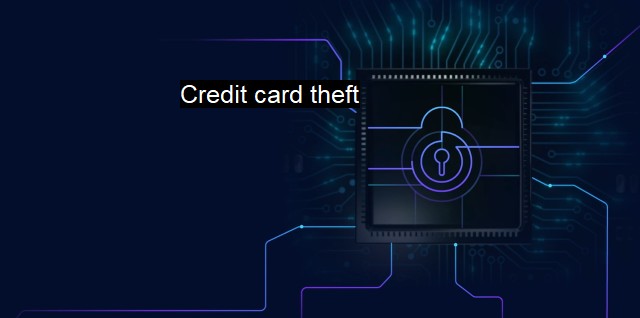What is Credit card theft?
Credit Card Theft in the Cybersecurity Era: Understanding the Risks and Countering the Threats
Credit card theft refers to illegal actions involving unauthorized access to a person's credit card information for fraudulent purposes. It is a widespread form of financial fraud that exposes victims to serious harm such as significant monetary loss and damages to their creditworthiness. Cybersecurity measures and the use of antivirus can help prevent credit card theft, and the violations singularly pertain to the digital realm, granting thieves a significant degree of anonymity and making their actions particularly challenging to stop and penalize.Credit card theft in the context of cybersecurity can take place in various ways. A common approach involves hacking a website or network system that stores credit card information. The hacker often uses sophisticated intrusion techniques to exploit vulnerabilities in those systems and gain unauthorized access to the data. Large scale data breaches can expose the credit card details of thousands or even millions of individuals, and the stolen information can then be sold on the darknet or used for fraudulent purchases.
Another method of credit card theft that utilizes the path of malware. Specific viruses are cultivated to compromise an individual's computer or mobile device, collect any stored credit card information, and discreetly relay it back to the cyber criminals. These viruses often arrive in deceptive emails or through illegitimate software downloads.
Phishing constitutes another widely used tactic in credit card theft. It relies on coercion and manipulation, duping victims into voluntarily handing over their credit card information. Phishing attempts often imitate emails or websites from legitimate financial institutions, entreating their victims to update their details due to a security breach or account glitch.
The impact of credit card theft is not limited to financial loss from fraudulent transactions. Victims may also suffer from long-term damage to their credit score, emotional distress, and might spend a significant amount of time and effort rectifying the situation.
Cybersecurity plays a vital role in assailing and staving off credit card theft. Security measures such as encryption help protect credit card data transmitted over the Internet, while network and system securities like firewalls and intrusion-detection prevent unauthorized access. As financial institutions embolden their cybersecurity architecture, their focus leans heavily into utilizing machine learning algorithms to discover and recount anomalous activities that indicate a potential credit card theft.
Antivirus software is an integral part of protection against credit card theft, showcasing primary defense against malware, viruses, and the attempts to compromise personal devices, collecting stored credit card information. Part of their utility steers into blocking phishing attempts and alerting users to fraudulent websites. antivirus software often provides scheduled scans to detect any malware that might have infiltrated the device.
Credit card theft is a prevalent cybercrime that poses serious problems to individuals and financial institutions. Cybersecurity measures and antivirus software must limit the damages these thieves can inflict by evolving continually. Suppose everyone in the digital community makes a consolidated effort to stay aware of preventative measures and the continuous upgrades of their protective software. In that case, we can make major inroads in fighting this breaches of financial security, engendering a much safer digital environment.

Credit card theft FAQs
What is credit card theft and how does it happen?
Credit card theft is a form of identity theft where someone steals your credit card information and uses it without your permission. This can happen through various means such as skimming devices at ATMs or gas pumps, phishing scams, or even by hacking into a retailer's database.What are the signs that my credit card has been stolen or compromised?
If you notice any unauthorized transactions on your credit card statement, receive notifications about suspicious activity from your bank, or receive credit card bills or statements for accounts you didn't open, these are all signs that your credit card may have been stolen or compromised.What should I do if I suspect my credit card has been stolen or compromised?
If you suspect your credit card has been stolen, you should immediately contact your bank or credit card company and report the unauthorized activity. They might cancel your current card and issue you a new one. You should also review your credit reports and consider placing a fraud alert or freeze on your credit files to prevent any future fraudulent activity.How can I protect myself from credit card theft?
There are several ways to protect yourself from credit card theft, including using strong passwords, regularly monitoring your credit card statements, avoiding phishing scams, using reputable antivirus software, and being cautious when giving out your credit card information. You can also consider using a virtual credit card for online purchases, which generates a temporary credit card number that expires after one use.| | A | | | B | | | C | | | D | | | E | | | F | | | G | | | H | | | I | | | J | | | K | | | L | | | M | |
| | N | | | O | | | P | | | Q | | | R | | | S | | | T | | | U | | | V | | | W | | | X | | | Y | | | Z | |
| | 1 | | | 2 | | | 3 | | | 4 | | | 7 | | | 8 | | |||||||